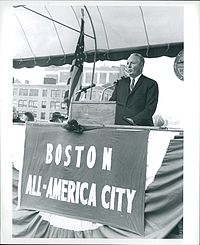John F. Collins
| John F. Collins | |
|---|---|

Mayor John F. Collins speaks at ground breaking of new Boston City Hall
|
|
| 50th Mayor of Boston, Massachusetts | |
|
In office 1960–1968 |
|
| Preceded by | John B. Hynes |
| Succeeded by | Kevin H. White |
| Member of the Massachusetts Senate from the 5th Suffolk District | |
|
In office 1951–1955 |
|
| Preceded by | Chester A. Dolan, Jr. |
| Succeeded by | James W. Hennigan, Jr. |
| Personal details | |
| Born |
John Frederick Collins July 20, 1919 Boston, Massachusetts |
| Died | November 23, 1995 (aged 76) Boston, Massachusetts |
| Resting place | St. Joseph's Cemetery in West Roxbury, MA |
| Nationality | American |
| Political party | Democratic |
| Spouse(s) | Mary Patricia Cunniff (m. 1946) |
| Alma mater | Suffolk University Law School |
| Profession | Lawyer |
| Religion | Roman Catholic |
| Military service | |
| Allegiance | United States of America |
| Service/branch | United States Army |
| Years of service | 1941-1946 |
| Rank | Captain |
| Unit | Counterintelligence Corps |
| Battles/wars | World War II |
John Frederick Collins (1919–1995) was the mayor of Boston, Massachusetts, United States from 1960 to 1968.
John Collins was born in Roxbury, Boston on July 20, 1919 to an Irish-Catholic family. His father, Frederick "Skeets" Collins, worked as a mechanic for the Boston Elevated Railway. Collins graduated from Roxbury Memorial High School, a public school in Boston, and in 1941 he graduated from Suffolk University Law School. He served a tour in the Army Counterintelligence Corps during World War II, rising in rank from private to captain.
In 1946, Collins married Mary Patricia Cunniff, a legal secretary, who Collins had met through his work as an attorney. She would later campaign for Collins when he was incapacitated by polio. The couple had four children.
In 1947, Collins was elected to the Massachusetts House of Representatives, representing Jamaica Plain, and, in 1950, to the Massachusetts State Senate. Collins spent two terms as senator and then ran unsuccessfully for state attorney general in 1954, losing to George Fingold. While campaigning for a seat on the City Council in 1955, Collins and his children contracted polio. Collins' children recovered and he continued with his campaign despite warnings from his doctors. As a result of the disease, Collins was forced to use a wheelchair or crutches for the rest of his life. He was elected to the Council and the following year was appointed Register of Probate for Suffolk County.
In 1959, he ran against John E. Powers for Mayor of Boston. Collins was widely viewed as the underdog in the race. Collins ran on the slogan "stop power politics", and was widely seen as independent of any political machine. Collins' victory in the 1959 mayoral election was considered the biggest upset in city politics in decades.Boston University political scientist Murray Levin wrote a book on the race, titled The Alienated Voter: Politics in Boston, which attributed Collins' victory to the voters' cynicism and resentment of the city's political elite.
...
Wikipedia
